Death in Lebanon
by Sarah Meyer
Index Research
(This article originally published on 11/08/2006
10 August 2006
On Wednesday August 9th 2006, Amy Goodman reported:
“Former Israeli Air Force Captain Reports Israeli Pilots Deliberately Missing Targets Over Concerns of Civilian Casualties.”
On a Fox News report: “I don’t think Israel is really bombing Lebanon, I think it is faulty construction that is causing these buildings to fall.” See 1 minute video here.
British media tell us that “200 Hezbollah” rockets were fired without mentioning that, eg., 4000 Israeli bombs were dropped in 250 air attacks within seven hours.
Beirut August the 9th
When I went home last night, I rushed to Kinda’s bed as usual. I pulled her arm and kissed her hand. For a second, I thought that her arm remained in my hand. Her small white arm left her shoulder and was in my hand. Suddenly she became parts and bits. Her foot was at one end of the bed, her leg was at the other. Parts and bits. My baby is nothing but parts and bits. Now, today, she is still in one piece. What is it that will prevent them from tearing her apart? What is it I can do to prevent them from tearing her apart?
Baby Waad has in her mother’s arms. She stayed there when the building fell on them. It was the rescuer who separated them. Waad died in one piece. Too small to be cut in two: she is, was, ten days old. From the mother, only one arm remained.
They killed baby Hadi too. He had his diapers on. His mother should have known better. She should have changed his diaper; it looked really heavy in the morgue.
They killed baby Manal. Baby Mohamad, baby Ali, baby every single name in the Arabic language. Those they missed here, they killed in Palestine.
“ya Ali” , the man was calling in Srifa. “Ya Ali, Ya batal” . That’s how he was calling his son, “hero”. The hero never answered back. The hero was under the rubble. Along others who are still under the rubble in Srifa. Along others who are still under the rubble in Houla, Aynatha, Aytaroun, Hallousiyeh, Taybeh, Maroon el Ras, Bint Jbeil. People are rotting under the rubble in every single village south of the Litany River in Southern Lebanon.
There was a day, at the beginning of this, when we felt sorry for those who lost their homes. Reporters would use their best writing skills to describe how bad one might feel if one looses one’s house: in houses, there are photo albums, there are books, music, and “memories”, the reporters said. It is not poetic to mention winter clothes, kitchen utensils, underwear, fridges, heaters, air conditioners, cars and other trivial details people in poor neighborhoods spend years saving to get. Talking about left behind medicine, Ids, deeds, medical reports, birth certificates and other “vital” stuff is more likely to move the readers.
Today, under the rubble, the house owners vanish. Forever they will keep their books, their music, their photos, their winter clothes, their medicine; they can hug their kids indefinitely.
Under the rubble, one village after the other, one house after the other, memories take their owners along. Ashes.
Pity the living, pity those who are left behind. Pity those who are dreading the day when it will be their turn to run down the streets, screaming, collecting the legs and arms of their loved ones, calling their names so loud their voices would reach the skies.”
Hanady
The Red Cross, on 7 August, said that “The Israeli military has denied permission for aid groups to move food and medicine to besieged villages in southern Lebanon for two days.” Robert Fisk (09.08.06) observes that “Israel’s Promise of Humanitarian Corridors Is Exposed as a Myth.” Hanady writes today (10 August): “Most hospitals announced they finished their fuel reserves. There’s a ship loaded with fuel that came all the way from Algeria and has been waiting in the Lebanese (poisoned) waters for days for an Israeli OK to come in. In the newspaper, the two generators we have are out of order and they’re cutting the electricity in some 15 minutes. So, I’m writing this in a hurry.”
The Guardian (10.08.06) casualty chart notes:
| Lebanon yesterday: To date: Israel yesterday: To date: | Civilians killed: Civilians killed: Civilians killed: Civilians killed: | 8 (at least) 1,005 0 35 |
Let’s have a reality check, folks? I would like everyone to see the photographs, with their captions, that have been sent to me by Lebanon’s As-Safir newspaper (click photos to enlarge.).
Here's what they did to Brital in the Bekaa, East Lebanon.
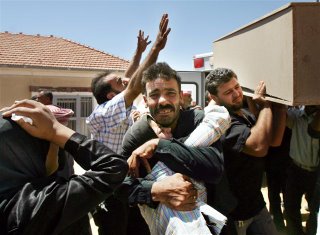
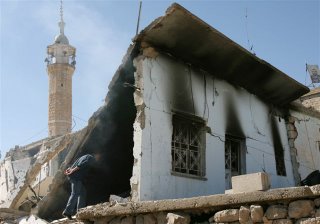 1.Mourners react while the coffins of
1.Mourners react while the coffins oftheir relatives, who were killed in an
Israeli attack, are carried towards the cemetery.(ap)
2.struck by Israeli war plane missiles at the village of Brital
in the eastern Bekaa Valley, Lebanon Tuesday, Aug. 8.(ap)


3. blood stains at a partly demolished
house that was struck by Israeli war
plane missiles at the village of Brital.(ap)
others, was struck by Israeli war plane missiles in
the village of Brital.(ap)
Here’s what they did to Manal Husseini in Ghaziyeh in the south.
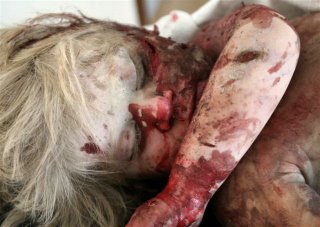 1.Manal al-Husseini, 3, lies dead at Al Raeh hospital
1.Manal al-Husseini, 3, lies dead at Al Raeh hospitalmorgue after an Israeli air strike on Ghaziyeh
village, south Lebanon.(reuters)
Hadi Jaafar.

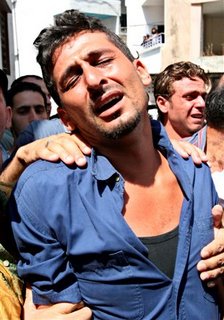 1.The father of Lebanese Hadi
1.The father of Lebanese HadiJaafar, 2, cries during the funeral
of his son.(ap)
Baby Waad, 10 days old
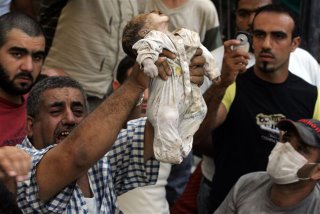
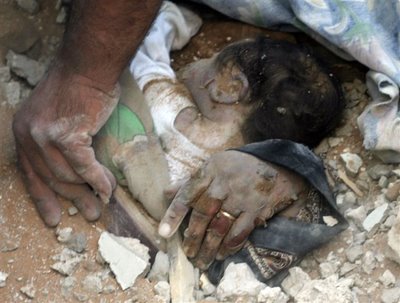 1.Lebanese Abbas Wehbeh shouts
1.Lebanese Abbas Wehbeh shoutswhile holding his 10 day old neice, Waad, 8 August(ap)
Here's what they did in Chiyah , Beirut

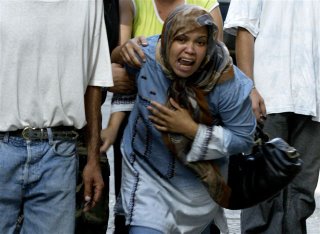 1.Lebanese Red Cross volunteers
1.Lebanese Red Cross volunteersand civil defense rescuers carry
the body of a child after it was
recovered.(safir)

 3.Body of a victim August 8 amidst
3.Body of a victim August 8 amidstthe wreckage of a building that was
hit by an Israeli raid in Beirut.(safir)
head trauma and brain contusion
rests in the intensive care unit.(ouc)

 5.Hassan Al Raai rests in the
5.Hassan Al Raai rests in theintensive care unit of Hayat
hospital in the Chiah suburb
of Beirut.(safir)
body of a baby after it was
recovered under debris of a
destroyed building (afp)
This is what they did to Ghaziyeh
southern town of Ghaziyeh, near
the port city of Sidon, Lebanon.(ap)
as they carry the bodies of relatives
for burial in Ghaziyeh, south Lebanon.(reuters)

 3.Mourner holds a copy of the Quran, Islam's holy book, in front of wrapped bodies of civilians during a mass funeral.(safir)
3.Mourner holds a copy of the Quran, Islam's holy book, in front of wrapped bodies of civilians during a mass funeral.(safir)
 5.Two Lebanese women mourn.(ap)
5.Two Lebanese women mourn.(ap) 
 7.A Lebanese woman lies in hospital.(safir)
7.A Lebanese woman lies in hospital.(safir)In Sour: The mighty power from above, leaflets and refugees


1.On debel(safir)
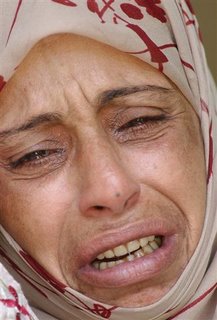

3.Fatmeh Abdallah(safir)
Sabrine Hayek

1.Sabrine Hayek, aged 10, lies on her hospital bed in the Lebanese village of Adloun(afp)
Refugees Hosting Refugees
“In Bass Palestinian refugees camp in Tyre, southerners took refuge. They say the Palestinians are going out of their way to make them feel at home: they borrow money and
 use their savings to buy them food. The Palestinians say this is the minimum they can do for those who had been hosting them on their land for 50 years. It takes a refugee to know what it means to be one.” Hanady
use their savings to buy them food. The Palestinians say this is the minimum they can do for those who had been hosting them on their land for 50 years. It takes a refugee to know what it means to be one.” Hanady

2.Palestinian women om qassem
prepare food. (safir)
3.Refugees in Tyre Palestinian camp.(safir)
Ethnic Cleansing
“Those who had so far been unable to leave their homes in the southern suburb did so today. They believed the warning the state of israel threw over the capital today, saying they had to leave their homes because they intended to bomb them.” Hanady.


1.A Lebanese woman sits on the
street waiting to leave Beirut.(safir)


3.Woman and her ailing husband
flee with their grandchildren(safir)
as she walks with her child(safir)

5.Woman sits on the street(safir)
Elsewhere in Lebanon
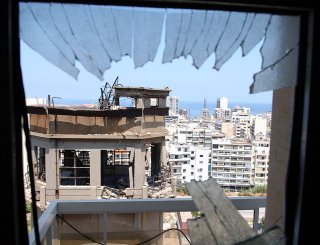

1.The old lighthouse next to my house(safir)
men look at a rocket.(afp)

 4.Mouawad after a night raid(safir)
4.Mouawad after a night raid(safir)Tyre
“Tyre was like a ghost town : the streets were empty, the fishermen did not go to work , the schools were trying to accommodate more people and the animals searched for food in garbage.” Hanady


1.Tyre: the hungry horse.(safir)
This is how our kids play

1.Displaced Lebanese children.(safir)
Long live the people of the world.

1. Pakistani Christian women light candles during a special prayer service for the Lebanese victims of Israeli air strike.(ao)
Protocol I, Article 85, Section 3 of the Geneva Convention: "An indiscriminate attack affecting the civilian population or civilian objects and resulting in excessive loss of life, injury to civilians or damage to civilian objects is a grave breach of the Geneva Conventions."
Article 15. At all times, and particularly after an engagement, Parties to the conflict shall, without delay, take all possible measures to search for and collect the wounded and sick, to protect them against pillage and ill-treatment, to ensure their adequate care, and to search for the dead and prevent their being despoiled.
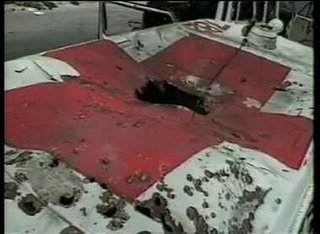
Article 19: Fixed establishments and mobile medical units of the Medical Service may in no circumstances be attacked.
Article 35. Transports of wounded and sick or of medical equipment shall be respected and protected in the same way as mobile medical units.
PS: 15 August 2006, from Hanady Salman.
Subject: my love and gratitude
Beirut aug 15th , 2006
This would probably be my last letter to you.
I will miss you all. Some of you I never met, but I feel that you are all so close to me. More than that, you probably already know it: without you I would not have made it throughout this hell. You were there, by my side and that made me stronger. Everyday, you gave more meaning to all this: people’s stories were heard, people’s suffering was shared. This was what I could do to my people : tell some of their stories. Knowing that you will listen, knowing that you will care made the whole difference.
As of yesterday, new stories will unveil : those returning to find .. nothing. Those returning to find their loved ones under the rubble. But returning anyway. 7 a.m. ( or 8) was the official time for the cease fire on Monday morning. People were on the roads at 7 sharp. I am so proud. Sad, hurt, but proud. Proud of my people, proud of their resistance, proud of their commitment and dignity.
Hussein Ayoub, my colleague, finally found his mother today. Ten minutes ago actually. He went to Aynatha in the morning and the rescuers were able to pull her out of the rubble of a house where she, and some 17 other people had taken refuge. We don’t know when she was killed. But at least he was able to recognize her body. She was 75. His father was killed by the Israelis in 1972.
We will be fine, I hope. We will burry our dead, the way they deserve to be buried, we will remember them as long as we live. We will tell their stories to our children; they will tell their own children the story: the story of a great people, one that never lost faith despite all the crimes, pains and injustices.
One that started rebuilding the minute the fighting stopped. Rebuilding although they know that the enemy might destroy everything again, as it did so many times before.
We will also tell them the stories of our enemy : how they killed our children , our elderly , how they hit us from the air, from the sea and from the ground and how we prevailed. How they starved our families in their villages, killed them on the roads, bombed their houses, their shelters, their hospitals, they even bombed vans carrying bread to them; and how in return we did not give up.
My grandmother used to tell me how people starved during World War One. I used to think I would never have similar stories to tell Kinda. Kinda, my heroine , Kinda my sweet little heroine who now , every time she hears the sound of a plane, rushes to my arms , points to the sky and says : Israel , Hweiyda wa wa.
Kinda my baby who survived her first Israeli aggression. To that, I will always be grateful, and I promise I will never forget that other babies were not spared. For them, I will keep telling Kinda the story. For them, Kinda will never leave this land. Kinda will know who her enemy is. Kinda will know this enemy can not beat us. Kinda will grow to respect all the men who fought for her on the front lines, and those who will rebuild her country again.
Kinda will also grow to know how important you, all of you, were part of her life during a long painful month in the summer of the year 2006.
To those I knew through this list: I hope I will get to meet you one day. To all of you : thank you for your support , your encouraging messages, your prayers, and your feelings for Kinda.
My love and gratitude to all of you.
Hanady Salman
PS : later today I will send some pictures from the villages where people returned.
Hanady

(18/12/2006):
Footnotes
[1] Hanady Salman is a journalist with As-Safir, Lebanon.
Lebanese woman writes of war.
20.08.06. Aljazeera.
Picture Album:
9/11 or Why Do They Hate Us?
The URL to DEATH IN LEBANON is: http://indexresearch.blogspot.com/2006/08/death-in-lebanon.html
Please see
Index on Illegal US Weapons in Lebanon
Please see Appendix I: Index on Illegal Weapons in Lebanon
Please see Appendix II: War Crimes in Lebanon and Palestine
Email: sarahmeyer@fastnet.co.uk
Tags: Lebanon, Israel, Fox News, Geneva Conventions






 Naomi Klein
Naomi Klein 


<< Home